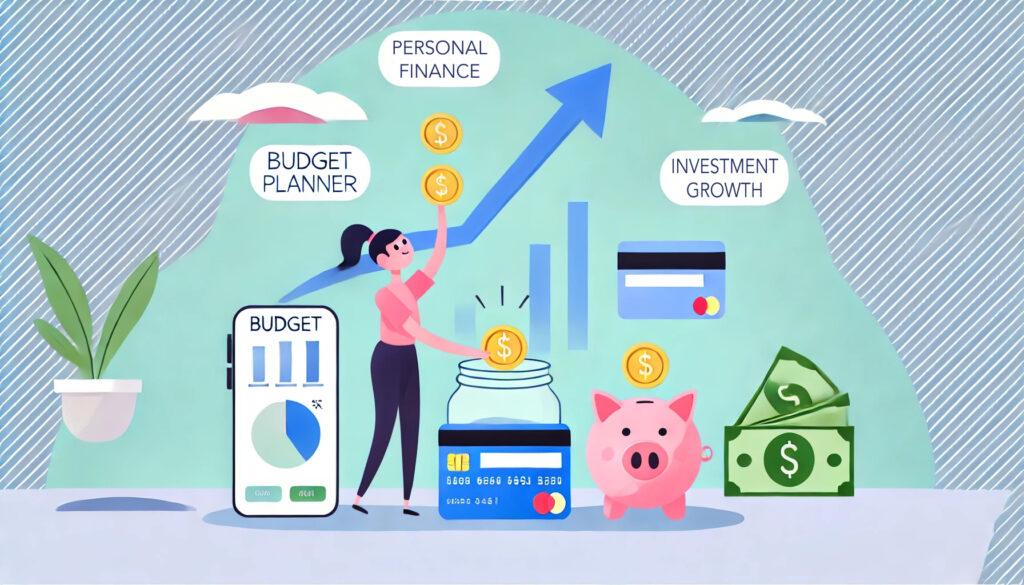I remember my first paycheck. The excitement quickly turned to confusion. I stared at the numbers, unsure of how to manage my money. Like many young adults, I was thrown into the world of personal finance without a guide. That’s when I learned how important financial literacy and money management skills are.
The journey to financial independence is rewarding. In 2024, 35 U.S. states require a personal finance course for high school graduation. This is up from 23 in 2022. It shows a growing need for financial education. Yet, many of us still struggle with the basics.
Did you know investing $200 a month at a 9% annual return for 40 years can save $856,214 for retirement? This fact amazed me and showed me the power of starting early. It’s not just about saving; it’s about making your money work for you.
In this guide, we’ll explore personal finance for young adults 101. We’ll cover budgeting to investing. Whether you’re fresh out of college or starting your first job, these tips will help you achieve financial freedom.
Key Takeaways
- Financial literacy is crucial for achieving financial independence
- Starting early with investing can lead to significant long-term gains
- Understanding taxes and salary implications is essential for budgeting
- Creating an emergency fund is a key step in financial planning
- Compound interest can significantly boost your savings over time
Understanding Financial Literacy
Financial literacy is a key skill for making smart money choices. It helps us manage our money, save for the future, and grow our wealth. Knowing how to handle money is crucial in today’s world.
What is financial literacy?
Financial literacy means understanding money basics. It’s about making smart financial choices. This includes budgeting, saving, investing, and managing debt.
The importance of financial education
Financial education is vital for a healthy money mindset. It teaches us to make smart financial decisions. Did you know 78% of adults in the U.S. live paycheck to paycheck?
This shows why learning about personal finance is so important. By understanding money, we can avoid financial traps and secure our future.
Key financial concepts for young adults
Young adults need to know several key financial concepts:
- Budgeting: Tracking our income and expenses
- Saving: Setting aside money for future goals
- Investing: Growing our wealth over time
- Credit: Understanding how borrowing works
- Insurance: Protecting ourselves from financial risks
Mastering these concepts helps us take control of our finances. It’s important to start learning about money management and wealth building early. The skills we learn now will help us for years.
Mastering the Art of Budgeting
Budgeting is key to financial success. I’ve learned that making a realistic budget is the first step. Let’s explore some budgeting tips and saving strategies to help you manage your lifestyle costs.
Creating a Realistic Budget
The 50/30/20 rule helped me when I started budgeting. It says to spend 50% on needs, 30% on wants, and 20% on savings and debt. It’s a simple way to balance your money.
Tracking Expenses Effectively
I use apps and spreadsheets to track my spending. This helps me find ways to save money. I also use the envelope system for fun money, which keeps me on budget.
Balancing Income and Spending
One key tip is to pay yourself first. This means saving and investing before spending on other things. I aim to save 15% of my income for retirement, including any company match.
| Budget Category | Percentage of Income | Example ($3000 monthly income) |
|---|---|---|
| Necessities | 50% | $1500 |
| Discretionary Spending | 30% | $900 |
| Savings and Debt Repayment | 20% | $600 |
Remember, budgeting is a continuous process. I regularly check and adjust my budget. By following these tips, I’ve taken control of my finances and am moving towards a secure future.
Building a Strong Financial Foundation
Creating a solid financial base is crucial for young adults. Let’s explore some key steps and smart strategies for managing debt.
First, saving is essential. Experts recommend saving three to six months’ worth of living expenses. This fund can help in unexpected times.
Next, we need to talk about credit management. Sadly, about one in five U.S. adults lack enough credit info. To avoid this, use credit cards wisely and pay bills on time to build a good credit score.
Debt avoidance is also key. With credit card interest rates at 20.78%, it’s wise to avoid unnecessary debt. If you have high-interest debts, pay those off first.
Here’s a quick overview of important financial steps:
- Save 3-6 months of expenses for emergencies
- Use credit responsibly to build a good score
- Avoid high-interest debt
- Pay off existing debts strategically
| Financial Goal | Action Step | Benefit |
|---|---|---|
| Emergency Fund | Save 3-6 months of expenses | Financial security |
| Credit Management | Pay bills on time | Improved credit score |
| Debt Avoidance | Limit credit card use | Reduced interest payments |
| Debt Repayment | Focus on high-interest debts | Faster debt elimination |
By following these steps, we can build a strong financial foundation. This will help us succeed in the future. Remember, making smart money choices today will secure our financial freedom tomorrow.
Personal Finance for Young Adults 101: Essential Skills
Learning key financial skills is crucial for financial freedom. Young adults should focus on banking, credit scores, and setting goals.
Managing Bank Accounts
Knowing how to manage accounts is the first step. It’s important to have a checking account for daily needs and a savings account for emergencies. High-yield savings accounts help grow your money faster.
Understanding Credit Scores
Credit scores are vital for financial health. Paying bills on time and keeping credit use low are key. Avoiding too many credit checks also helps. A good score means better loans and lower rates.
Developing Healthy Financial Habits
Good money habits are essential. I save regularly, use credit wisely, and keep learning about finance. Setting clear goals keeps me motivated.
- Create a budget and stick to it
- Track expenses using apps or spreadsheets
- Set up automatic savings transfers
- Review financial goals monthly
By mastering these skills, I’ve laid a solid financial foundation. It’s important to start good habits early for financial freedom.
Investing for the Future
As a young adult, I’ve learned that investing is key to building long-term wealth. Let’s dive into some investment basics and retirement planning 101 to set you on the path to financial freedom.
Introduction to Investment Basics
Understanding investment fundamentals is crucial. I was shocked to learn that only 36% of Gen Z are financially literate. Nearly 80% rely on social media for financial advice. That’s why it’s important to grasp concepts like risk tolerance, diversification, and compound interest.
These investing basics form the foundation of smart financial decisions.
Retirement Planning for Young Adults
It’s never too early to start planning for retirement. Recent college grads typically plan for a 40 to 50-year investment timeline. They aim for financial freedom by age 43.
Options like 401(k)s and IRAs offer tax advantages, making them attractive choices for long-term savings. Remember, time is your greatest asset when it comes to retirement planning 101.
Exploring Different Investment Options
When it comes to investing basics, there’s a world of options to explore. Stocks, bonds, mutual funds, and index funds are just a few possibilities. The key is to start early and be consistent.
I’ve found that setting aside 20% of income for investing, as per expert advice, can make a significant difference. By understanding these investment basics and starting early, even with small amounts, you can harness the power of compound growth. This sets you up for a secure financial future.
Let’s sum it all up!
In conclusion, gaining control of your personal finances as a young adult is key to long-term financial success. By mastering basic financial principles such as budgeting, saving, investing, and managing debt, you can set yourself up for a future of financial freedom. It’s all about creating healthy money habits early, allowing you to navigate life’s financial challenges with confidence.






